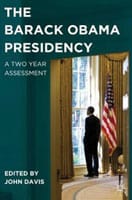U.S. Policy and the Arab Awakening
U.S. Policy and the Arab Awakening
by Dr. John Davis

Dr. John Davis
The decision by Tunisian street vendor Mohamed Bouazizi to commit an act of self-immolation on December 20, 2010, as a form of protest against the corruption that dominated the country’s political system unleashed a tumultuous wave of protests and counter-protest violence that engulfed states in North Africa and the Middle East. As the protests unfolded and it appeared that American autocratic allies (whether in Algeria, Egypt, Morocco or Yemen, to name a few) would collapse like dominoes, foreign policy commentators questioned President Barack Obama’s response to the Arab Awakening.
There were those who viewed the Obama administration’s reaction to the sweeping uprisings as a contagion infecting, if not upsetting, the tempestuous stability that had been meticulously constructed during and in the wake of the Cold War epoch. Within Washington circles there were those on the left and the right who demanded a definitive administration response. Inside and outside Washington, Middle East scholars asserted the events offered Obama an opportunity to construct a “grand design” that could shape the transformative events and provide generational stability in an area of the world renowned for political corruption, terrorism and oppression.
A question begs: are the aforementioned characterizations of Obama’s policy during the Arab Awakening correct or fair? The criticism for the most part was on point, but the piquant comments about Obama’s policies overlook a salient reality: The president’s response to events in the most explosive region in the world can best be described as one of confusion. The confusion is not out of ignorance but where Obama finds himself is trapped in a policy time-warp. As the president of the United States, Obama is the caretaker of policies that preceded his administration. When nascent forces emerged that impacted stability and threatened U.S. interests in the region, Obama was placed in the uncomfortable position of presiding over arrangements that were facilitated by autocratic leaders that stood in the way of forces he himself nurtured. At issue is how did Obama respond to direct challenges to that old order?
The upheaval in Egypt provided salient evidence of the Obama administration’s early policy paralysis. For perspective, it is important to return to Obama’s June 4, 2009, address in Cairo, Egypt. Obama delivered one of his signature foreign policy speeches that appeared to “stir the pot” of change in the region: “I do have an unyielding belief that all people yearn for certain things: the ability to speak your mind and have a say in how you are governed; confidence in the rule of law and the equal administration of justice; government that is transparent and doesn’t steal from the people; the freedom to live as you choose. These are not just American ideas; they are human rights. And that is why we will support them everywhere.”
Critics charged that as the events unfolded in Egypt, Obama failed to live up to those words. With Hosni Mubarak’s government envisaging extinction, Obama and his senior advisors provided evidence of policy paralysis that defined an administration caught between preserving the old order that protected American regional interests and movements that threatened them.
As further evidence of confusion, administration officials trumpeted the idea of “reform from above.” This policy initiative was designed to mute the protest movement in Egypt, delay the anticipated government transition, and preserve American interests. The reaction from the protestors was swift: The perception among the protesters in Tahrir Square was that Obama was working to delay the inevitable dissipation of the Mubarak regime.
Domestically the American media hammered Obama for the absence of a definitive policy in Egypt and for the failure to provide presidential leadership during the wave of transformative changes in the region. The exchange between a reporter and Obama during a presidential news conference on February 15, 2011, exemplifies the point:
Reporter: What’s your message to the protesters? Do you want them to taste freedom? Or do you want them to taste freedom only if it will also bring stability to our interests in the region?
Obama: Well, first of all, without revisiting all the events over the last three weeks, I think history will end up recording that at every juncture in the situation in Egypt that we were on the right side of history. What we didn’t do was pretend that we could dictate the outcome in Egypt, because we can’t. So we were very mindful that it was important for this to remain an Egyptian event; that the United States did not become the issue, but that we sent out a very clear message that we believed in an orderly transition, a meaningful transition, and a transition that needed to happen not later, but sooner. And we were consistent on that message throughout.
Critics charged Obama’s statements during the news conference were not consistent with administration policy. Disagreement with and frustration over the direction of administration policy prompted reporters to answer a significant question: What was really behind administration policy? Ryan Lizza, a correspondent for the New Yorker, provided this observation:
According to a senior administration official, “The question in our mind was ‘How do you manage that?’” Obama’s instinct was to try to have it both ways. He wanted to position the United States on the side of the protesters. … Nonetheless, Obama wanted to assure other autocratic allies that the U.S. did not hastily abandon its friends, and he feared that the uprising would spin out of control. … Obama’s ultimate position … was to talk like an idealist and act like a realist.
Elsewhere in the region, protestors from Cairo, Damascus, Manama and Sana‘a continued to express frustration and recoiled at the conspicuous examples of American hypocrisy. How could the Obama administration, for example, intervene to prevent a “humanitarian crisis” in Libya but not intercede in Bahrain, Yemen or Syria where civilians were slaughtered at rates that far exceeded the violence that was perpetrated against anti-Qaddafi forces?
It is often overlooked that across the region protesters were inspired by Obama’s powerful declaration on March 28, 2011, that justified the successful U.S.-led NATO intervention in Libya:
Gaddafi declared that he would show “no mercy” to his own people. He compared them to rats, and threatened to go door to door to inflict punishment. In the past, we had seen him hang civilians in the streets, and kill over a thousand people in a single day. We knew that if we waited one more day Benghazi … could suffer a massacre that would have reverberated across the region and stained the conscience of the world.… To brush aside America’s responsibility as a leader and – more profoundly – our responsibilities to our fellow human beings under such circumstances would have been a betrayal of who we are. … Some nations may be able to turn a blind eye to atrocities in other countries. The United States of America is different. And as president, I refused to wait for the images of slaughter and mass graves before taking action.
Officials in Washington failed to comprehend that protestors outside of Libya viewed the Obama declaration as a call to order, as an impetus to protest autocratic leaders within their countries, and they envisioned that if their governments mounted sustained violence against their movements, they assumed that Obama would enlist NATO aircraft to save them. That did not occur in Yemen and should not be anticipated in Syria. In the wake of the blowback, administration officials recognized that presidential rhetoric must be tempered with a dose of reality: no single presidential speech or American policy can hope to address the challenges and opportunities that were created in the wake of the birth of the Arab Awakening.
In recognition the world was listening to his every word, on May 19, 2011, President Obama offered a far more robust speech designed to flesh out U.S. strategy in the region:
For six months, we have witnessed an extraordinary change taking place in the Middle East and North Africa. … The question before us is what role America will play as this story unfolds. For decades, the United States has pursued a set of core interests in the region: countering terrorism and stopping the spread of nuclear weapons; securing the free flow of commerce and safeguarding the security of the region; standing up for Israel’s security and pursuing Arab-Israeli peace. We will continue to do these things, with the firm belief that America’s interests are not hostile to people’s hopes; they’re essential to them. Yet we must acknowledge that a strategy based solely upon the narrow pursuit of these interests will not fill an empty stomach or allow someone to speak their mind. Moreover, failure to speak to the broader aspirations of ordinary people will only feed the suspicion that has festered for years that the United States pursues our interests at their expense. … After decades of accepting the world as it is in the region, we have a chance to pursue the world as it should be.
The speech was billed as strategic and far-reaching; this was not the case. Rather, the speech was designed to quiet a gathering storm of criticism that questioned the inconsistencies and confusion associated with administration policy during the Arab Awakening. The speech did have its high points: Obama pledged more political and economic support for the democratic aspirants in the region, and he publicly recognized what Kevin Boreham referred to as “the historic nature of Arab uprisings.”
In the final analysis, administration policy during the Arab Awakening can be viewed through multiple prisms. Confusion and policy paralysis best defines the early months of the administration’s policy during the wave of Arab uprisings. The New Yorker’s Lizza offers this description that outlines another perspective: Obama’s “reluctance to articulate a grand synthesis has alienated both realists and idealists.” In short, irrespective of the numerous speeches designed to illustrate a forward-looking strategy, the president never articulated a framework to guide administration policy or one that would bring balance to the transformative events in the region. Finally, there is this analysis: Obama’s many speeches did captivate the protestors inducing many to form organizations that would assist in bringing down oppressive regimes. And when the military impulse was required, as was the case in Libya, Obama demonstrated leadership that ousted an autocrat leader, Muammar Gaddafi. Collectively, these perspectives illustrate a mixed presidential legacy in the most defining movement in the 21st century.

“The Barack Obama Presidenty: A Two Year Assessment”
Dr. John Davis is the director of the graduate program in international security studies in Trinity’s School of Professional Studies. He is also the editor of The Barack Obama Presidency: A Two Year Assessment, published by Palgrave Macmillan (2011). He has published other books, including: Terrorism in Africa: The Evolving Front in the War on Terrorism, editor (2010); Target Towers: New York and the Path to 9/11 and Its Aftermath (2009); Barack Obama and U.S. Foreign Policy: Road Map for Change or Disaster? (2009); Barack Obama’s Historic Election: A View from Howard University (2009), Africa and the War on Terrorism, editor (2007); Perspectives in Black Politics and Black Leadership, editor (2007); Presidential Policies and the Road to the Second War in Iraq: From 41 to 43, editor (2006); The Global War on Terrorism: Assessing the American Response, editor (2004) and he is the author of over 40 book chapters, journal articles, and books reviews.